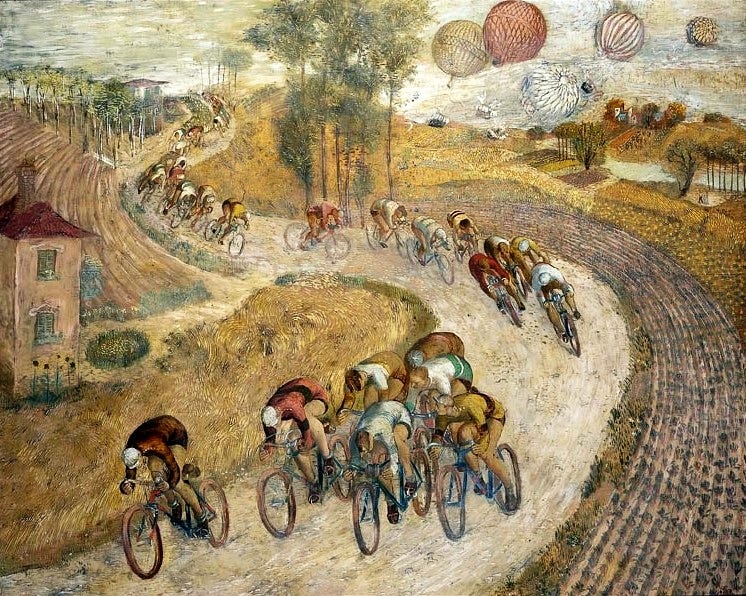Update and Reflections: 3 Years of Street Theologian
Global stats, article rankings, reflections, how you can help us
1. What we’re about
2. Our global subscriber network- 25 countries, 26 US States
3. Top 10 articles since 2020
4. Top 10 articles in 2023
5. Short on time? Short-form articles by popularity ranking
6. Reflections
a. We all have a darker nature than we think
b. Hurt people hurt people
c. Identity crisis- the fight never stops
d. Balance curiosity with pragmatism
e. Peace and joy are accessible today
7. How can you help us?
In August 2020, the first Street Theologian page was launched. I have much to reflect on over the last three years and am grateful for the ways in which God has used writing for this site to help grow me closer to him, realise my own fallenness and how little I know, while also helping reach people in the process.
It started with a heart God had, rather painfully, started shaping by his grace after years of scepticism, an old laptop, a room full of books piled to the ceiling and a cemetery across from my workplace at the time regularly reminding me the time left to reach people is short and could end at any moment.
By God’s grace, we’re still here over 50 articles later.
More regular updates? https://twitter.com/StreetTheologn
What we’re about
Street Theologian aims to equip Christians around the globe, in a time-efficient, accessible and convenient manner, on how to grapple with difficult issues while seeking to honour and draw closer to Christ in their lives and to provide non-believers, broad and varied exposure to and a case for the beautiful, life-changing truth of Jesus as divine, risen Lord and Saviour.
A truly global network
We are very grateful for the way in which God has blessed us with connections around the world over the last few years. We have met friends far more knowledgeable than ourselves, who have helped review our articles and who live on entirely different continents from each other!
Our subscribers come from a total of 25 countries. The most common country, Street Theologian subscribers call home, is perhaps unsurprisingly the USA, accounting for roughly 49% of total subscribers with subscribers coming from 26 different states in the US. California is comfortably the most popular state for our subscribers to reside, followed by Texas, Arizona, Pennsylvania, and Florida which all have similar numbers of subscribers.
After this, Nigeria, Australia, India and Great Britain account for between 4-12% of subscribers each.
The Nordic countries are well represented with subscribers from Sweden, Finland and Norway along with subscribers from nearby Austria and Germany.
A variety of African countries are represented including South Africa, Cote d’Ivoire, Ethiopia, Nigeria and Zambia.
South America and Southern Europe are relatively poorly represented, only with subscribers coming from Brazil. Asia and the Middle East are also relatively untouched with few readers outside of India and Japan.
Australia, Canada and New Zealand are well represented. Please be praying God draws us closer to him, giving us wisdom in writing in the future, and that we will continue to reach more and more people.
Top 10 articles since 2020
5 Biblical facts showing why the pre-trib rapture is a scam (2020)
12 Reasons most Christian men are hooked on porn and what to do about it (2022)
Did Jesus rise from the dead? Your comprehensive 2023 Guide (2023)
How arrogant of you to think every other religion is wrong (2023)
Frequently Avoided Questions: How did we get the Bible? A crash course (2023)
Quoting Ehrman: 20 Bart Ehrman quotes every NON-CHRISTIAN should know (2023)
16+11 Reasons why you can forget about being a King James Onlyist (2022)
Not sure where to start? I’d probably recommend the resurrection guide (no. 4) as Christianity stands and falls on the resurrection. The article also touches on the existence of Jesus, Gospel reliability, Jesus as divine, a response to the materialist case against miracles, a brief comment on alleged contradictions in the Bible and more!
Top 10 articles in 2023 so far
Frequently Avoided Questions: How did we get the Bible? A crash course
Quoting Ehrman: 20 Bart Ehrman quotes every NON-CHRISTIAN should know
Are the Gospels based on eyewitness accounts? 10 key considerations
The Virgin Births of Secularism: 10 impossible things you assume everyday
Where is your ATTENTION going? 5 Biblical Ways to refocus your attention
Something shorter? Ranking of shorter-form articles
Short Conversations: Seventh-Day Adventists on the Sabbath (2022)
Short Conversations: Are the 4 Gospels based on eyewitness accounts? (2023)
Short Conversations: Pre-Trib Rapture is Fiction Only (2022)
Are modern Bible translations wildly corrupted? Short conversation with a KJV Onlyist (2023)
Short Conversations 2023: Did Jesus rise from the dead? (2023)
The white oppressive origins of Christianity: 3 Key Events (2023)
5 Key Reflections
1. We all have a darker nature than we think
The Bible, world history, and psychological experiments all point to the depth of the darkness of human nature. We are naturally devoid of the Spirit (Jude 19), with our hearts deceitful above all (Jer. 17:9) and our heads sick (Is. 1:5). Ordinary men and women have not shied away from raping, torturing, killing, and abusing their fellow humans when such behaviour is approved by a powerful political leader or ideology, meaning when no real consequence needed to be faced for such behaviour. Exemplifying this are books such as Ordinary Men covering cruel behaviours engaged in by ordinary Nazi citizens and the Rape of Nanking.
Iris Chang outlines some horrid acts performed by Japanese soldiers in the Rape of Nanking (p.6), “Chinese men were used for bayonet practice and in decapitation contests. An estimated 20,000 – 80,000 Chinese women were raped. Many soldiers went beyond rape to disembowel women, slice off their breasts, and nail them alive to walls. Fathers were forced to rape their daughters, and sons their mothers, as other family members watched… So sickening was the spectacle that even Nazis in the city were horrified, one proclaiming the massacre to be the work of bestial machinery.”
The people performing such atrocities as outlined in these two books were mostly ordinary people with families, parents, mostly people with no criminal history, people doing their nation proud and doing enough to keep their jobs. The sort of people you’d run into in a coffee shop or at a football stadium. People like us.
In our minds, we regularly cling to proud, lustful, unforgiving and hateful thoughts. Psychological experiments reveal we are far less likely to change our minds in the face of evidence than we think.
Moreover, the clear majority of humans have no issue electrocuting another human if commanded to do so by a human authority figure (Milgram experiment) or abusing a subordinate human if they are in a position of authority over them (Stanford Prison Experiment).
With this in mind, we need to regularly step back. Bring our hearts before God. Examine our motives. Grieve over our sins and recognise our utter dependance on Christ’s work for us.
The greater the darkness, the more the light of Christ can shine.
2. Hurt people hurt people
We hurt people and we are hurting inside ourselves. We are all hurting in ways we don’t even understand and aren’t even aware of. It is a broken world. We often cover this hurt and despair by putting on a facade. We are prone to rudeness, abusive comments, hate, or even avoiding and running away from situations we should really be working to address.
Behind much of this is hurt. We all get triggered by things without doing the hard work to understand why. I do it all the time.
Sometimes sceptics can be more open for a conversation if you’re prepared to listen to what story or hurt they are hiding behind the vitriol. I’ve seen this multiple times over the last few years. Does it always work? Absolutely not, but worth keeping in mind.
I also received lots of highly critical comments from men in Christian circles who were stuck in difficult marriages and felt watching porn was the only thing keeping them from cheating on their wives. Again, behind this was hurt.
Christ was hurt by us and for us. He calls us to bring our hurt to him and be shaped by his love. Pour out your heart before him (Ps. 62:8).
Love makes all that is grievous and heavy to be light as nothing. St. Augustine
3. Identity crisis- the fight never stops
Making consistent time over several years to write articles about Christianity does not automatically translate to being close to God. The spiritual battle is minute by minute. Our need for Christ is paramount even in the tiniest fraction of a second.
Being prayerful is barely easy. Doing work for the site instead of lazing around is barely easy. Putting Christ ahead of other idols is never easy. The fight goes on. Fortunately, we’re not on our own in the battle or else it would be lost already.
It is easy to try and focus on building others up in the body of Christ due to the love Christ shows us and then make the very activity we are engaging in the basis for our identity, instead of Christ himself. Moving from one idol to another without even realising it.
We are sustained by Christ’s work, not our own. Our work, although an indispensable part of Christian living, is an act of gratitude to God for what he has done.
4. Balance curiosity with pragmatism
I’m naturally a very curious person. I love learning. Our articles cover a very broad range of topics. Yet, there’s no point in filling our minds with meaningless details. In my writing, I constantly need to cull paragraphs out before publishing a post. Our minds can easily spend far too much time on unimportant details. I’d never write anything if I waited until my knowledge was perfect.
What is your learning achieving? Are you balancing time spent learning things that give you momentum in life with things with give you intellectual depth with things that bring you closer to God? Are you sharing your learnings or what you read with others? Are you balancing time learning with human interaction? Balance and variety are essential.
If you’re studying apologetics, can what you’re learning be used in an argument? If you’re studying the historical context of the Bible, is what you’re learning helping you understand a passage? If you’re reading something to bring you closer to God, is it convicting you of sin?
5. Peace and joy are accessible today
We always tell ourselves if only. If only you had kids before your friend, if only your relative wasn’t so nagging, if only your boss was nicer, if only you made a bit more money. On and on it goes. There’ll always be something missing or lacking in our lives.
We book long vacations and travel to distant lands (a gift from God nonetheless!) to try to escape reality, inevitable despair.
Through Christ, we have access to something which transcends the day to day. Something beyond the false idols of career, sex, artificial stimulants, status, wealth, relationships and body image which the world gives us.
Christ promises us through him our joy may be complete (John 16:24). A peace which surpasses all understanding (Phil. 4:6-7). A love which fills us, satisfies us (Eph. 3:14-21).
The question every single one of us has to answer again and again is if we will choose to truly believe these promises or not. There is a world of difference between an intellectual acceptance of these truths and a humble, loyal belief in the truths day to day.
How can you help us?
Share specific articles of interest with your sceptical friends (we cover a lot of different topics)
Ask your Christian friends and family to join our newsletter on Substack or by sharing this post
If you’re on Medium or Twitter, follow us or share our posts with your network on these platforms
Write to us with your story or feedback at streettheologian@protonmail.com
Pray for us and for our readers
If you know someone who will benefit from being on our Substack mailing list, why not let them know?
A sincere thanks to our loyal readers.
Article archives spanning back to 2020:
https://streettheologian.medium.com/
More regular updates? https://twitter.com/StreetTheologn
Where is your ATTENTION going? 5 Biblical Ways to refocus your attention
What are you paying attention to? Who are you talking and listening to in your mind? Ask your soul questions- why do you feel this way, my soul? Practice being grateful to God The hidden danger- appearances can be deceiving By paying a certain kind of attention, you can humanise or dehumanise, cherish or strip of all val…
Freud, Faith, Family and Feelings: Are you a Christian because of your parents?
Should I take your belief seriously if you inherited it from your parents? Thanks for reading Street Theologian! Subscribe for free to receive new posts and support my work. 1. Christianity far from being a crutch for the weak or a pure projection of desire, grew and continues to spread during times of in…














